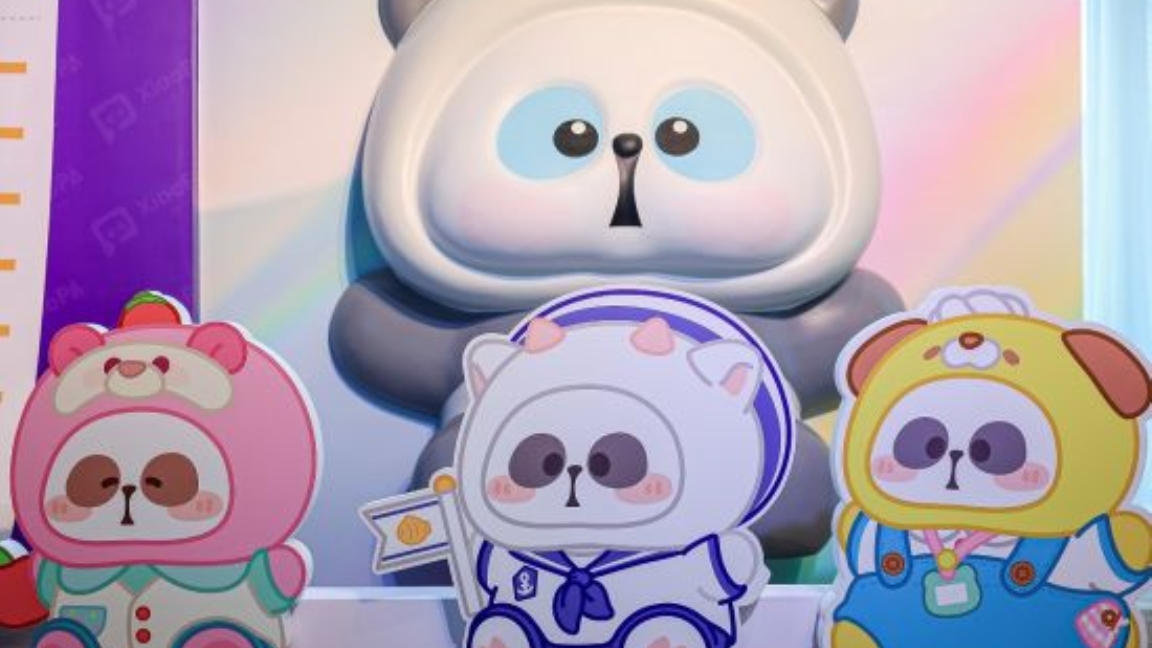

Toycity kicks off XiaoPA in Shanghai, a fluffy, interactive panda designed as a companion for both adults and children.
Artificial intelligence is no longer just for complex industrial applications. It's now entering our homes in children's toys, companions for lonely adults and pastimes like chess.
Industry giants like ByteDance, Espressif Systems, iFlytek, JD.com, Shanghai Film Group and ZTE are all pouring money into what might be called emotional applications of advances in chip, large language, robotics and other embodied intelligence technologies.
"The phenomenon of women over 30 in the workplace having no one to talk with late at night and children having no one to entertain them is becoming increasingly common," said Zheng Bo, chairman of Toycity. "We hope to use technology to make trendy AI toys a true emotional anchor."
Toycity recently launched XiaoPA in Shanghai, a fluffy, interactive panda designed as a companion for both adults and children. It features a chip from Espressif Systems and an AI model from ByteDance's Volcano Engine. Its cost starts from 899 yuan (US$125).

Companies display "emotional smarts" in robots or AI toys at this year's World Artificial Intelligence Conference in Shanghai.
At the recent World Artificial Intelligence Conference in Shanghai, a multitude of companies showcased "emotional smarts" in robots. From palm-sized "pocket pals" to larger home-based companions, these products all rely on large language models to make emotional connections with humans.
Fuzozo, an AI-powered toy developed by Shanghai Film Group, is designed to facilitate real-time emotional interaction and learning.
Wang Le, chief executive of Shanghai-based FoloToy, which focuses on AI-assisted learning for languages and public speaking, said the company has already sold 20,000 units in North America, Europe and Japan.
Shenzhen-listed ZTE, China's largest public telecom equipment manufacturer, debuted its robot Mochi, a pet-like device that provides comforting sounds and gestures in response to human emotions.
The global market for AI companions is projected to reach as much as US$150 billion by 2030, a 10-fold increase from its present size, according to ARK Invest. Tech companies are eager to spread their expertise across as many uses as possible.

Fuzozo, developed by Shanghai Film Group, is showcased at WAIC.
The technology behind this AI expansion is a hybrid of on-device and cloud-based systems. Espressif, a key component supplier, explained that its chips handle on-device functions like gestures and voice recognition, and privacy-focused data processing. Cloud-based large language models, such as ByteDance's Doubao, provide the complex conversational intelligence.
"This is a 'body + soul' framework," said Wang Dong, vice president of Espressif. "The cloud-based large model provides interactive intelligence, while the Espressif chip is responsible for connectivity."
Found in 2008, Espressif was listed on Shanghai STAR Market in 2019, valued at 23.7 billion yuan now. Last year, it shipped more than 200 million chips and chipsets, a key component for AI toy and other devices.
ByteDance's Volcano Engine AI platform averaged daily hit volume of 16.4 trillion by June. It supports features such as video calls and English-language instruction. The company plans to expand its "digital companionship" services.

Robot chess players are shown at WAIC.

A Fuzozo-themed store is going to open in Xujiahui.
Meanwhile, AI firms like iFlytek and SenseTime have also entered the market with AI chess and Go playing companions. IFlytek's Alpha Egg, for example, is an AI-powered Go training toy that caters to all skill levels, from beginners to professionals. It also includes eye-care features, making it a well-rounded tool for both learning and well-being.
Even the cultural sector is joining in. Shanghai Film Group's AI toy Fuzozo, provides interactive companions offering emotional connections to Generation Z consumers. A Fuzozo-themed store will open in downtown Xujiahui later this year. The listed arm of the film group surged almost 50 percent this year. No doubt we'll likely see more Chinese film characters brought to life as AI toys in future.
(Zhu Qing also contributed to this story.)

